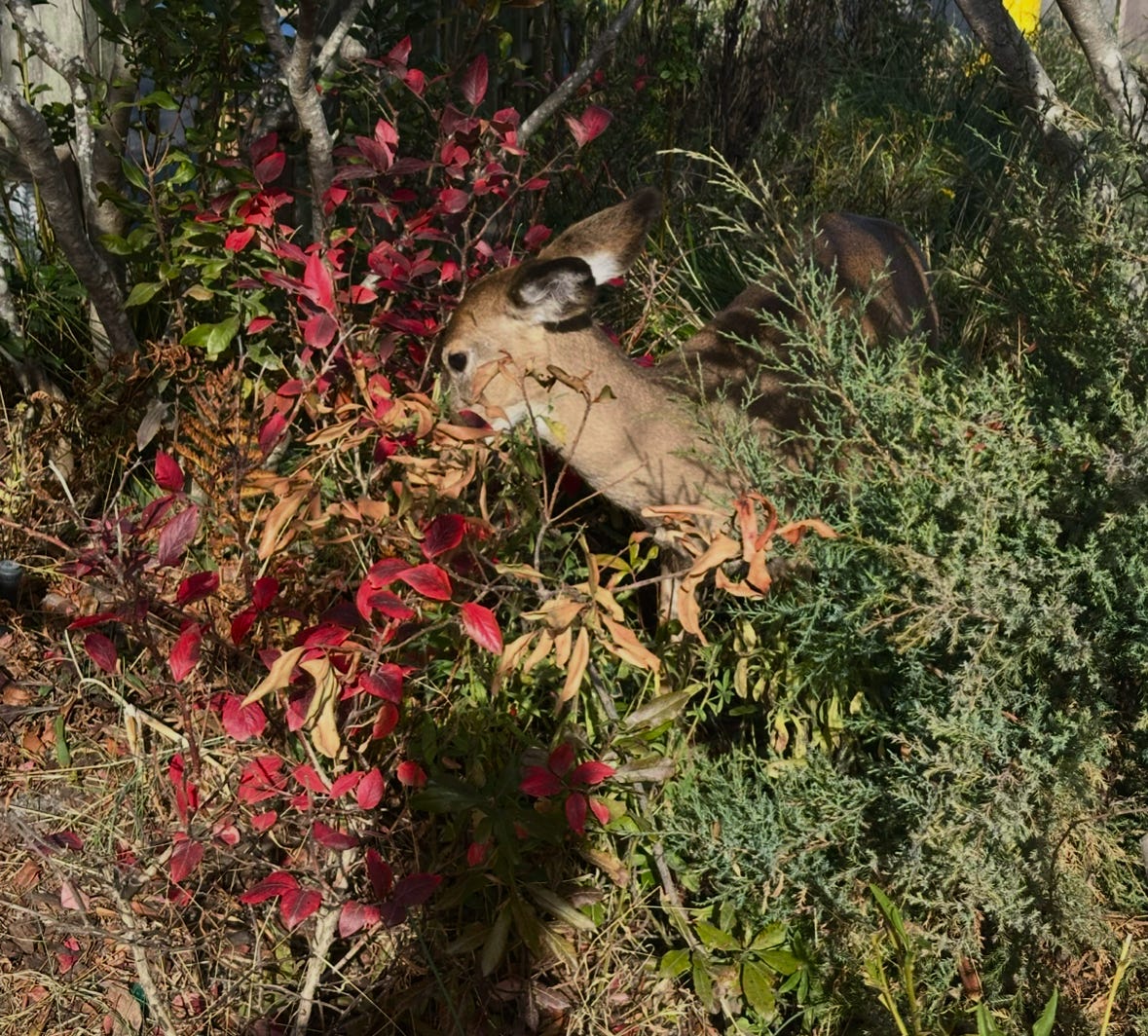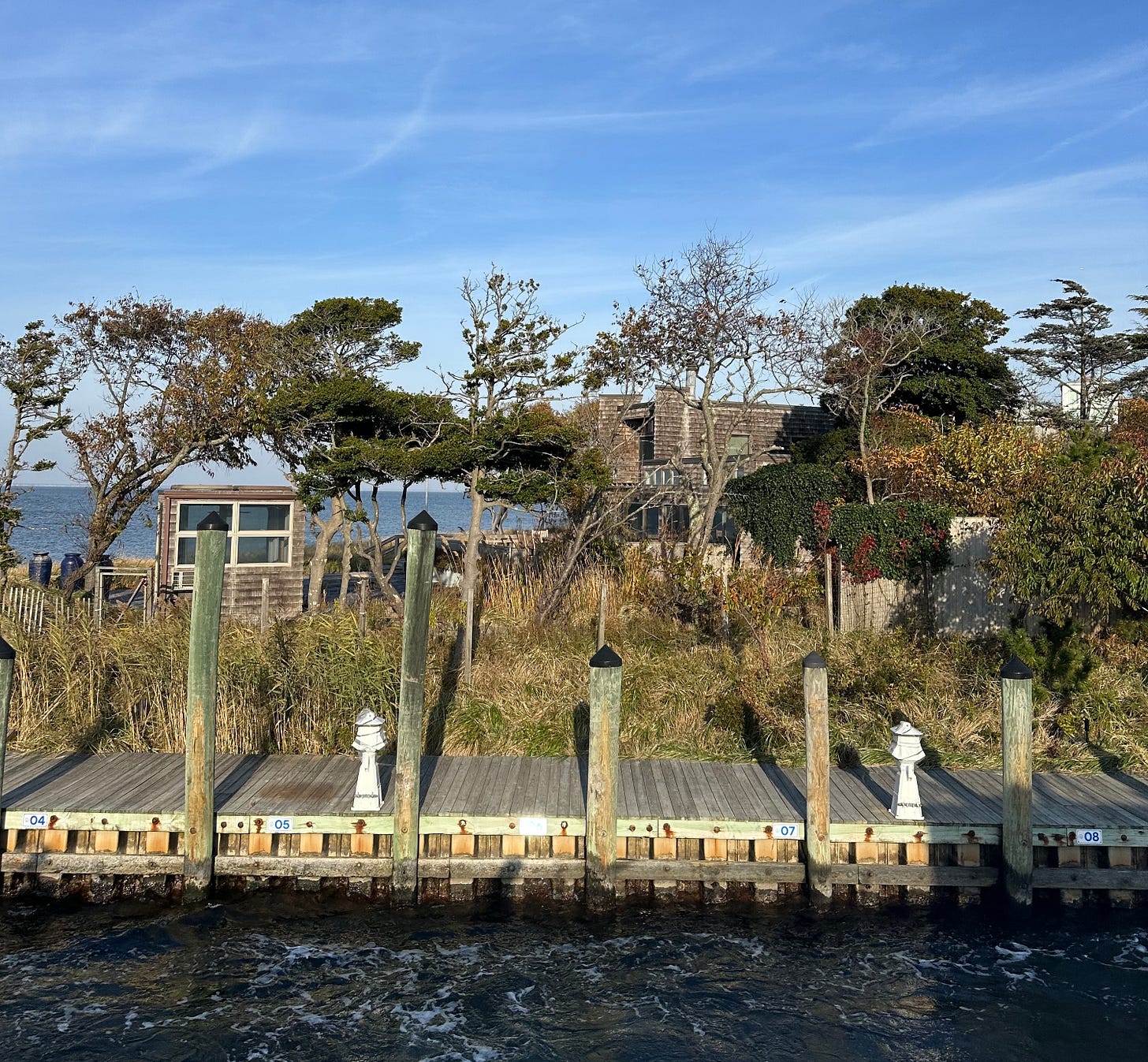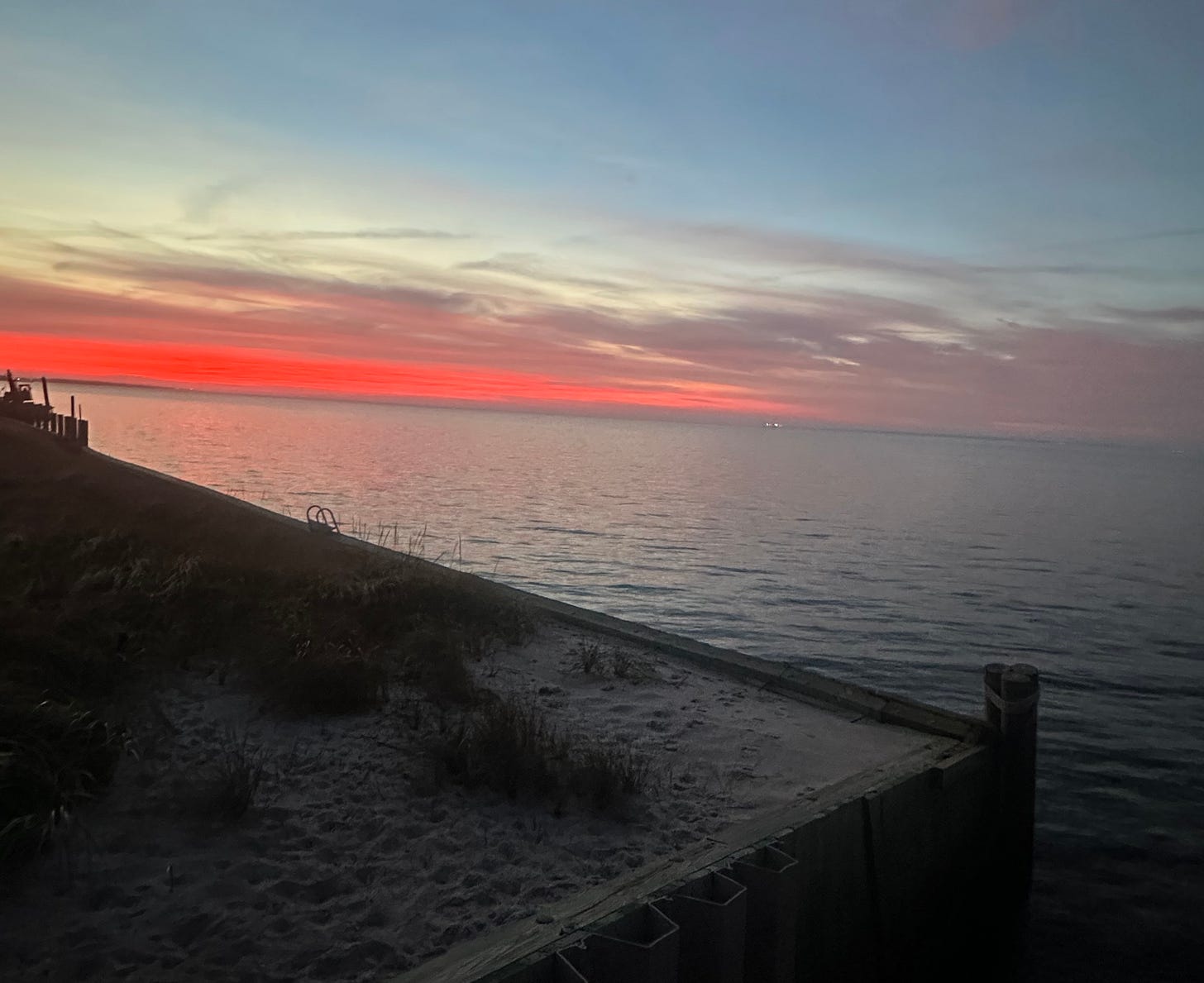You Are My Sanctuary
And I yours (whatever happens this election) ...

Last week, the day before Halloween, I took the ferry from the edge of Long Island to the Fire Island Pines. A very nice friend had invited me to spend a day and night of the off-season there. It was my second time on the island in the last few months.
The last time I went, it was the dead of summer. Then, the island was as it is in most people’s minds—teeming with queers who were partying and having sex and lounging on the beach and blasting dance music and finding joy in the idyllic surroundings and in each other.
This time around, the ferry, which only travels to the island two or three times a day in the fall, had 10 people on it. And the island had perhaps 75 or 100—a mix of those who don’t mind (or quite enjoy) staying somewhere without cars, groceries, entertainment or shopping through the cold months, and the laborers who travel there each day in the off-season, fixing up houses before it gets too cold to do so. Much of this fixing up entails repairing damage from water from the past season, or preparing (see: lifting the houses onto stilts) for the inevitable damage from water from the coming seasons—Fire Island is not-so-slowly being engulfed by the rising sea around it.
My second day there, I took a walk solo through the Pines, down the wood plank boardwalks, past all the empty homes, to the northern edge of the neighborhood, where the houses abruptly end at a national park that separates gay Fire Island from straight (there are, apparently, straight communities to the north and south of the Pines and Cherry Grove, talked about by the gay denizens as if they are far away and exotic and forbidden lands and not…like…a mile away). And then I walked back down south, toward where I was staying, this time via the beach, though to call it a beach would be generous—it was at that moment a concerningly-narrow strip of sand abutting the Atlantic Ocean.
It was Halloween, less than a week before the Presidential election, and 75 degrees out.
For the past several weeks, I have been in somewhat of a funk. I thought this was simply because I was listening to the foreboding-sounding new Lady Gaga single Disease too much (aOoahooAoohaooooOAohhaooOAHhhh), but apparently most of my friends and family have been feeling it too.
At first I theorized this collective funk was a subconscious recognition that Trump was going to win—that we were all engaged in a pre-grieving process, steeling ourselves for the inevitable. But now I believe it’s larger than that, or at least has been for me: it is a recognition that whatever happens, we’re still kinda, in many ways, fucked. Whether Harris or Trump wins, the beach of Fire Island will continue to erode. Sure, one would make the beach erode more quickly, but neither have any interest in stopping the violence of capitalism from ruining the beauty of our world.
But in that sad fact, I’ve begun to search for hope; begun to look for evidence that while we may live in particularly ruinous times, that we are not temporally alone. And the more I search, the more I find that we are not. That this is how it has always been. Indeed, that gay history in particular is always this—moments of sanctuary, ruined by reality; the sanctuary then rebuilt, and then once again ruined by those who are threatened by it, or at the very least have no use for it.
Without discounting the particular horribleness of this moment, I think it is important that we do not become ahistorical in our despair—that we realize that even in the world’s darkest moments that sanctuary is a thing constantly being built. And that it can be, and most often has been, found not in the politics of a warmonger, and not even in a physical place (especially not a place as exclusionary and temporary as Fire Island), but, as corny as it may sound, in each other.
I have been focused a lot on that search for sanctuary recently, though that focus has only become conscious to me in these last couple of weeks. The music I’ve listened to, the things I’ve read, the movies I’ve watched, the places I’ve traveled, they’ve mostly been about finding sanctuary in eras of darkness. My trip back to Fire Island was in some ways part of that search too—a chance to for 24 hours re-inhabit respite before a particularly stressful few days (aka the election and its aftermath).
While there, I happened upon two texts. One was a glossy and very large magazine called Fire Island Tea. In addition to the expected photos of gay mens’ butts and fluffy profiles of local influencer/activists, there was a poem, written by a friend of mine named Mark Campbell. The poem is about Fire Island, but also about the AIDS crisis of the 1980s and 1990s. It is about how horror and sanctuary existed side-by-side, or, really, how they were and always are intertwined.
At the beginning of the poem, five men lay on the beach and have a nice, unremarkable time on the island. They cook for each other. They gossip. They cuddle. And then by the end of the poem, one is dying of AIDS at St. Vincent’s (the now-closed hospital which was central to providing care during New York’s AIDS crisis; it was located a few blocks from where I grew up in the West Village; I remember when I was about six or seven asking my mom who the sick man was in our building and learning about HIV for the first time. The hospital is now a luxury condominium building). In Campbell’s poem, he writes that as the man lay dying in the hospital, he remembers Fire Island. The poem ends with a conversation between the friends from the island:
The waves roll in, The waves roll out. “I’m in.” “Sure. Me, too.” “Count on me. What’s another year?” “Where else would we go?”
Even, and perhaps especially while facing death, this is to where the man’s thoughts return—this place that should be mundane in its ability to provide respite, but of course is not.
The second text I picked up was a book about the history of Fire Island by Jack Parlett, titled Fire Island: A Century in the Life of an American Paradise. It was through that book that I learned how crucial the place has been to queers seeking sanctuary from a world that, especially at the community’s beginning, was extremely hostile to them. As I rode the ferry back to the mainland, I learned that in 1966 the poet Frank O’Hara had died very close to where I’d walked alone on the beach the day prior.
There was mystery surrounding O’Hara’s death. He was hit by a vehicle that was traversing the beach late at night, but some believe the crash was intentional—the vehicle’s driver was a well-liked straight man from the local community, and at the time there was a lot of resentment over the gayification of the Pines and Cherry Grove. Some accused the man of murder.
Whether the death was deliberate or not, it punctured the sense that Fire Island truly was a respite. It became a reminder that no matter how hard people try to create security around themselves and their loved ones, we are all still unavoidably connected to the terrors of the outside world. Or really, that there is no outside world from which to disconnect, only one world that is filled with both terror and respite simultaneously. Sometimes we have more of one than the other. Sometimes the era in which we happen to live is more heavily weighted toward one or the other. But, nearly always, both exist.
O’Hara’s work could be interpreted in myriad ways, but I see many of his poems as about this tension between reality and respite. Parlett, in his history of Fire Island, points to one poem by O’Hara in particular—Ode To Joy. Its first line reads, almost like a plea: We shall have everything we want and there’ll be no more dying.
In his life too, O’Hara seemed to embody that very gay thing—the idea that the good life, the respite life, did not only have to live in fantasy. That we did not have to accept reality but instead could force respite to overtake it.
In his eulogy for O’Hara, the painter Larry Rivers, an on-again-off-again lover of O’Hara’s, wrote: “I always thought he would be the first to die among my small, happy group. But I day-dreamed a romantic death, brought about by too much whiskey, by smoking five packs of Camels a day, by too much sex, by unhappy love affairs, by too many poems, too many dance concerts, and just too much living.” To Rivers, it was unfair that O’Hara did not die by living life in its most fantastical way, but instead at the hands of reality—in a bed in a shitty hospital on Long Island. As Rivers put it in the eulogy: Frank, as he lay dying, looked as if he was, “an innocent victim of someone else’s war.”1
O’Hara’s death felt almost revanchist, a reclamation by the straights of the island and all it represented. As if the fantasy the gays were trying to actualize had gone too far. Respite had had its moment in the sun. Straight reality had to reassert itself.
After O’Hara’s death, a friend of the poet found a poem in O’Hara’s apartment titled A True Account Of Talking To The Sun At Fire Island. In it, O’Hara appears (to me at least) to be awakened (literally and spiritually) by the sun, only for the sun to tell him that it cannot be there forever; that O’Hara must internalize its lessons and spread them around the world whether the sun is there or not.
The sun says: And now that you are making your own days, so to speak, even if no one reads you but me you won't be depressed. Not everyone can look up, even at me. It hurts their eyes.
“Sun, don’t go!” O’Hara implores. But the sun is busy. It has to shine on other places: “The jungle, the tundra, the sea, the ghetto.”
The people in those places are calling for the sun too. What people, O’Hara wonders. The sun replies: “Some day you’ll know. They’re calling to you too.”
The sun, maybe, is saying to Frank: don’t hog me. You’ve had enough of me. And I can only do so much—you must also act as the sun too.
It is the day before the Presidential election in the United States, and despite how stressed I am, I realize that I have been fortunate enough to have the sun shine on me many times. The world is often a horrible place, but some of us have more protection from those horrors than others. And even when, and perhaps especially when, we get to live in that sun-filled place, protected from reality, it is our responsibility to not hoard that sunshine, to help spread it beyond its usual borders.
It is our responsibility to live life in this way—accepting and spreading the sun; to live it in each of our idiosyncratic ways as if our deaths will come from how Larry Rivers imagined Frank O’Hara’s death would come—from too much living, all while acknowledging that it could end instead in the most horrifically mundane way, through the violence of reality.
As I wrote this essay, I found myself listening to Madonna’s 1994 album Bedtime Stories over and over again. And especially to the song titled, yes, Sanctuary. The song came out at the very height of New York’s AIDS epidemic (Madonna lost many friends to the virus, and has advocated for those with HIV and AIDS throughout her career). In the song, Madonna sings over a sparse and vaguely haunting beat: “Who needs the sun, when the rain is so full of life? Who needs the sky, when the ground is open wide? It’s here in your arms I want to be buried. You are my sanctuary.”
The future is scary, and maybe also hopeful, and probably both. But I know now my responsibility regardless of which way it tracks—to not only bask in the sun, but to internalize it and become it and then share it with others as much as I possibly can.





A poetic , hopeful meditation that draws on beauty of places in nature and reliance on relationships to counter anger and despair with the state of our world. Yes, while it is true that whoever is elected will not protect our mysterious beaches or hidden dwelling places of fawns , we can build our sanctuaries. Riverss added an important way to save ourselves in his elegy for O’Hara. Even in his loss, Rivers drew on the almost- humorous observation that his friend suffered a violent death without distinction, rather than the death from excess that Rivers anticipated.
Life punches us with losses of family, friends , and elections. Paris counters with his well earned conflicts : We can hear anger and disappointment and resignation and appreciation for friends meld into hope for survival in providing sanctuary . Rivers adds the need to survive through laughing at ourselves as we live through creativity but die always the wrong way anyway
I am reminded of a story told to me years ago by my friend , Helen. When she was a prisoner at Auschwitz, weighing half her weight before slavery and being without even shoes in the winter, she and several others were looking among the clothes of the dead for anything warm to wear. They hurried to avoid being caught and murdered but , telling the story to me years later , Helen noted “I was a skeleton but I still had a tuchas to cover. “ Humor in a death lager. Humor——when you have lost your parents , siblings , home , clothes , and food. So there we have collaboration of the current thesis . Although survival depends on a kaleidoscope of luck , it helps to want to love and be loved , and to be able to laugh at yourself. Helen lived to enjoy and to create safe places to tell stories , mainly about wanting to live with people you love. Paris takes is on paths through ways to maintain the desire to live even in this world of losses .
Found myself coming back to this over the past couple days, especially today, to maintain hope. Thank you for this much needed reframe!